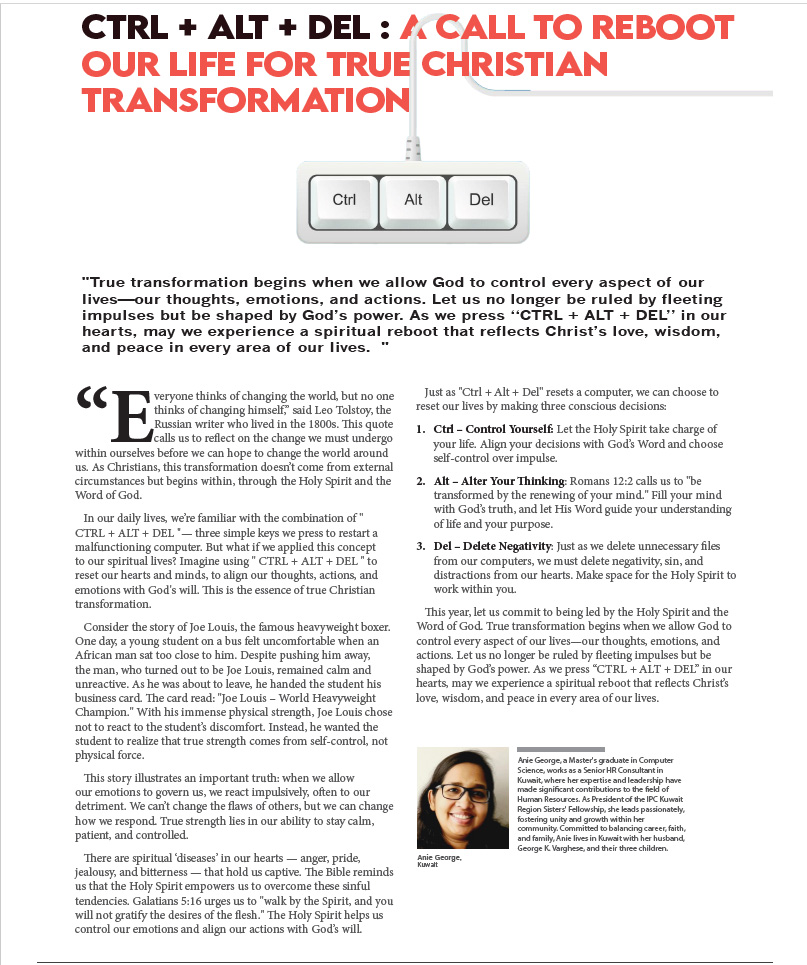Articles
God is always at work for us and for our good

Psalm 18 is a psalm of David, a song celebrating “the day when the Lord rescued him from the hand of all his enemies, and from the hand of Saul.” This psalm, the longest of Book One, praises God for His deliverance. It is also recorded, with slight differences, in 2 Samuel 22. At the center of this psalm is a strong confession of faith: “With the merciful you show yourself merciful” (Ps. 18:25).
This psalm begins (vv. 1–6) and ends (vv. 46–50) with praise offered to God. It is praise filled with love and thanksgiving for God’s protection from enemies and from death. The praise rejoices in the victories God has given His king and His people — victories displayed before the world.
The central section of the psalm (vv. 20–29) celebrates the faithfulness of David and of God. David served the Lord with integrity (we will look at the difficulties that seem to surround this kind of claim below). The Lord on His part had always been reliable and blessed His king. On each side of this central meditation on faithfulness we have the record of God’s powerful help for David (vv. 7–19; 30–45). Each of these two sections has its own character. Verses 7–19 emphasize the work of God to save David. Verses 30–45 highlight David’s success as God worked through him.
In light of this overview of the psalm’s structure, we want to look more closely at several points. First, how can David claim to be blameless (vv. 20–24)? The claim of blamelessness is a recurring theme in the Psalms. It is stated with special force in Psalm 26:
Vindicate me, O Lord, for I have walked in my integrity, and I have trusted in the LORD without wavering. Prove me, O Lord, and try me; test my heart and my mind. For your steadfast love is before my eyes, and I walk in your faithfulness. I do not sit with men of falsehood, nor do I consort with hypocrites” (Ps. 26:1–4).
But David is a murderer and an adulterer, to name only some of his sins. How can he claim to be blameless?
We need to recognize that David was a devoted and persevering follower of the Lord even though he did fall into very serious sin. When Nathan confronted him with his sins, he repented and grieved deeply for them. He expressed his repentance in beautiful psalms of penitence such as Psalms 32 and 51. His life as a whole was characterized by his faithful keeping of God’s covenant in obedience and repentance.
What David pleads, then, is not absolute moral perfection. He recognized that by such a standard he would never stand: “Enter not into judgment with your servant, for no one living is righteous before you” (Ps. 143:2). Rather, he pleads his faithfulness in comparison to the wickedness of those who hate God and His king. He makes this comparison not to claim that he deserves or has earned God’s favor, but to show that God’s saving grace has really made him different from the wicked in the ways in which he thinks, believes, and lives. David loves the Lord and His law, so his sin is grievous to him and he willingly repents and seeks to lead a godly life. In contrast, the wicked despise God and His holy law. They ignore God and seek in every way to harm their neighbor.
Again, David is not claiming that his perfect righteousness earns him God’s favor. Rather, he says God has brought him into His covenant and given him the integrity that he has. It is “God who equipped me with strength and made my way blameless” (Ps. 18:32). He belongs to God and follows God and therefore knows that God will be kind to him. It is not the self-righteous whom the Lord saves, but the humble: “For you save a humble people, but the haughty eyes you bring down” (Ps. 18:27). All his strength comes from the Lord (v. 1) and the faith or trust of the psalmist always turns to the Lord for help (Ps. 18:2; cf. Ps. 26:1: “I have trusted in the LORD without wavering”). The foundation of God’s care for David is not David’s deserving, but the Lord’s election: “He rescued me, because he delighted in me” (Ps. 18:19).
While David wrote this psalm and had every right to sing it in his faithfulness, once again we see the psalm drawing our minds beyond David to one greater and purer than David. This psalm belongs more to the Christ, who was fully blameless in every way, than to David. Paul demonstrates this in his use of this psalm in Romans 15:8–9. He writes:
For I tell you that Christ became a servant to the circumcised to show God’s truthfulness, in order to confirm the promises given to the patriarchs, and in order that the Gentiles might glorify God for his mercy. As it is written, “Therefore I will praise you among the Gentiles, and sing to your name” (Rom. 15:8–9).
In citing Psalm 18:49, Paul shows that it speaks of Jesus at least as much as it does of David. Indeed, even David can claim covenantal integrity only as he is in Christ.
Another feature of this psalm is the vivid picture of God’s coming to David’s rescue (vv. 7–15). David cried out for help (v. 6) and the Lord answered. “He bowed the heavens and came down; thick darkness was under his feet. He rode on a cherub and flew; he came swiftly on the wings of the wind” (Ps. 18:9–10). The fury of the Lord shook the earth (vv. 7, 15) and thunder and lightning preceded him (vv. 12–14). Hot smoke poured forth from his nostrils and fire from his mouth (vv. 8, 15).
Here is a marvelous picture of the power and determination of God to save. But when in David’s life did this happen? As we scan Old Testament history, we can find no such episode. Something like this happened when the Lord met with Israel at Mount Sinai, but nothing close to it happened in David’s experience.
The explanation is, of course, that David is speaking poetically here. He records not what he saw with his physical eyes, but what his eyes of faith saw happen. Although this awesome power of God usually remains hidden from view, it is absolutely real, and it is exercised for the well-being of His people. God is always working powerfully and passionately for His people even when we do not see it. David’s poetic imagery shows us more than eyes can see.
This truth is taught over and over again in the Bible. We need to have it taught repeatedly because we are so inclined to think that only the visible is real. Think of the experience of Elisha. He sat in Dothan apparently defenseless against the strength of the king of Aram. When his servant panicked, Elisha replied, “Do not be afraid, for those who are with us are more than those who are with them” (2 Kings 6:16). And then to comfort his servant further, Elisha prayed and God did an amazing thing. “Then Elisha prayed and said, ‘O Lord, please open his eyes that he may see.’ So the Lord opened the eyes of the young man, and he saw, and behold, the mountain was full of horses and chariots of fire all around Elisha” (2 Kings 6:17).
Elisha had never been in any danger, for the Lord was on his side.
We see something similar when the authorities came to arrest Jesus in the garden of Gethsemane. Jesus appeared weak and defenseless. Peter, in a panic, tried to protect Him with a sword.
Then Jesus said to him, “Put your sword back into its place. For all who take the sword will perish by the sword. Do you think that I cannot appeal to my Father, and he will at once send me more than twelve legions of angels?” (Matt. 26:52–53)
Jesus submitted to arrest not because He was helpless, but because He accepted the Father’s will for His death and our redemption.
This psalm reminds all of us that God is always at work for us and for our good. In the New Testament, the Apostle John makes the same point: “He who is in you is greater than he who is in the world” (1 John 4:4).
We do not need to fear, for God will save us in His good time. We should praise God for His mercy and help as this psalm does.
Sources:Christian Post
Articles
CTRL+ALT+DEL: A call to reboot our life for true Christian transformation
Articles
7 ways we rebuild through Christ

When a person comes to Christ, it’s not just about being forgiven and waiting for heaven. Salvation is an ongoing process of regeneration where a person becomes a new creation, reshaped by the power of the cross. This process involves rebuilding every area of life according to God’s design. Today, we’ll explore seven key areas that are rebuilt in Christ.
1. Our personal life is no longer based on self
We are born in sin and naturally live according to the lusts of the flesh (Ephesians 2:1-3).
But in Christ, we begin to live a cross-shaped life, learning to deny ourselves and follow Jesus (Mark 8:34-36).
“And calling the crowd to him with his disciples, he said to them, ‘If anyone would come after me, let him deny himself and take up his cross and follow me’” (Mark 8:34-36).
The crucified life is a life where self is no longer at the center — God is. We are called to serve others, rather than live for self-gratification(Galatians 2:19-20).
We actually find our life when we lose it! We discover the best version of ourselves when we die to ourselves and allow Christ to live in us and through us.
2. Our families are shaped according to God’s Word
After coming to Christ, family life should be rebuilt and shaped by Scripture. One way is to disciple our children and teach them about God.
Psalm 78:5-7:
“He established a testimony in Jacob and appointed a law in Israel, which he commanded our fathers to teach to their children, that the next generation might know them, the children yet unborn, and arise and tell them to their children, so that they should set their hope in God.”
Furthermore, parents are instructed to raise their children according to the Word of God, ensuring that our homes reflect biblical values and generational faithfulness (2 Timothy 3:15-16).
3. We do business God’s way
The Bible teaches that work is not merely a means to provide for ourselves; it is an act of worship.
Genesis 2:15 illustrates that Adam was called to work even before he had a wife and children. It was an act of worship since, as His image bearer, he imitated the God who worked 6 days before He entered His rest.
“The LORD God took the man and put him in the garden of Eden to work it and keep it.”
Like Adam, we work because we are made in the image of a God who worked to create the world. In business, we walk in integrity, treat employees as partners, equip them to flourish in work, and prioritize honoring God. This means creating environments that reflect God’s kingdom values, including allowing people to worship on Sundays.
4. We use our wealth to spread the Kingdom
Deuteronomy 8:18 reminds us that God gives us the ability to produce wealth, not just for personal gain, but to advance His Kingdom. As believers, we are called to steward our finances in a way that reflects God’s mission, investing in the expansion of the gospel, meeting needs, and helping to establish justice and mercy on earth.
Money is not evil, but the love of money is evil. Money can also be used to advance the kingdom.
I.E., God was able to use “The Good Samaritan” because he had wealth (Luke 10).
God used Joseph of Arimathea who buried the body of Jesus because he had financial resources.
God used Lydia, who had her own business and started a church because she owned a home and was a business owner (Acts 16).
5. We are called to reflect Christ by serving our communities
Titus 2 and 3 show us that we are not just called to serve within the walls of the church, but to be profitable to all people.
2:7 says “Show yourself in all respects to be a model of good works …”
2:14 says Jesus purified people “who are zealous for good works.”
3:14 says “let our people learn to devote themselves to good works …”
This means our communities should see the light of Christ through our good works.
History is replete with how Christ’s followers have rebuilt cities and nations and served humanity in a way that forever impacted nations.
Isaiah 61:4 says:
“They shall build up the ancient ruins; they shall raise up the former devastations; they shall repair the ruined cities, the devastations of many generations.”
6. The Church is called to reparent and rebuild individuals
Jesus’ invitation to “follow me, and I will make you …” demonstrates the Church’s role in rebuilding lives (Matthew 4:19). Through biblical discipleship, we help people discover their God-given purpose and destiny.
Discipleship is more than instruction; it’s walking with people to see them transformed and equipped to fulfill their calling in Christ.
Jesus didn’t say, “follow me and I will give you a weekly bible study. He gave people the opportunity to do life with Him, which created the environment to make disciples and bring about personal transformation.
7. The Church participates in the renewal of all things in Christ
God called Adam to bring His influence on the whole earth.
Genesis 1:28. God’s ultimate plan with and through the church participating with Jesus is to renew all things through Christ (Ephesians 1:9-11). We are not just waiting for the second coming; we are active participants in the restoration of creation through the gospel. As we live in alignment with God’s kingdom, we anticipate the fulfillment of this promise in the climax of history with a new heaven and new earth (Revelation 21:1-8).
Five practical takeaways
1. Embrace daily denial of self: Evaluate your life and ask where you need to surrender personal desires in favor of following Christ. This is the first step toward living a cross-shaped life.
2. Create a family discipleship plan: Begin setting time aside weekly to disciple your children or encourage your family members in the Word of God. Make your home a center for spiritual growth.
3. Work with integrity and purpose: Consider how your work can reflect God’s glory. Are you treating your employees or coworkers with dignity and empowering them, or are you merely using them to get your work done?
4. Be a faithful steward of wealth: Make a decision to invest in Kingdom causes. Pray about where your resources can make a Gospel-centered impact — supporting missionaries, funding outreach, or caring for the poor.
5. Serve your community: Identify a way to serve your community this week. Whether it’s through volunteering, meeting a need, or simply being present in a meaningful way, show Christ’s love in action.
As we participate in this process of rebuilding, God transforms us, our families, our work, and, ultimately, the world around us. Let us surrender fully to Christ and trust Him to rebuild every aspect of our lives for His glory.
Sources:Christian Post
Articles
God’s peace and the world’s peace are not the same

Peace is not just a feeling, it is also a condition, a mindset, a state of being. It is a relationship with God Almighty who created you and loves you. Peace is where we want to live. But we live in an unpeaceful world full of strife, envy, jealousy, rage, competition, anxiety, fear, worry, and yes lust. We crave what we don’t have, and we don’t want what we do have. We long for peace.
The peace of God is the opposite of all that the world has to offer.
The world’s definition of peace is a state of tranquility, freedom from disturbance, and harmony in personal relations.
Who doesn’t want that?
Now listen to the story of Jesus and the peace He offers you and me.
“And the angel said to them, ‘Fear not, for behold, I bring you good news of great joy that will be for all the people. For unto you is born this day in the city of David a Savior, who is Christ the Lord. And this will be a sign for you: you will find a baby wrapped in swaddling clothes and lying in a manger.’ And suddenly there was with the angel a multitude of the heavenly host praising God and saying, ‘Glory to God in the highest, and on earth peace among those with whom he is pleased!’” (Luke 2:10).
Jesus comes to give peace!
Now you may think you know what peace is. But listen to what Jesus says about it,
“’Let not your hearts be troubled. Believe in God; believe also in me. In my Father’s house are many rooms. If it were not so, would I have told you that I go to prepare a place for you? And if I go and prepare a place for you, I will come again and will take you to myself, that where I am you may be also. And you know the way to where I am going.’ Thomas said to him, ‘Lord, we do not know where you are going. How can we know the way?’ Jesus said to him, ‘I am the way, and the truth, and the life. No one comes to the Father except through me’” (John 14:1).
Look at what Jesus also says in John 14:27: “Peace I leave with you; my peace I give to you. Not as the world gives do I give to you. Let not your hearts be troubled, neither let them be afraid.”
Jesus is the way to peace. And you may say, “Oh, I know what peace is!” But you don’t. You don’t know what peace is until you know Jesus. His peace is not like the world’s peace.
If you know Jesus, you will experience peace. If you don’t know Jesus, you won’t. Not in any real sense, that is.
The peace of God is a state of wholeness, calmness, and completeness.
As you compare the two definitions, the world’s definition of peace is an external definition based off circumstances and human relationships.
If you are trying to get to a permanent condition of peace based off external circumstances and human relationships, you are going to be more unpeaceful than you are now. The peace the world offers you is circumstantial. The peace God offers you is complete, consistent, whole, and perfect regardless of what is going on in your life. It doesn’t come from without, it comes from within.
Let me explain. When Jesus returned to Heaven he promised to send the Holy Spirit.
“These things I have spoken to you while I am still with you. But the Helper, the Holy Spirit, whom the Father will send in my name, he will teach you all things and bring to your remembrance all that I have said to you”(John 14:26).
The Greek Word here is Paracletos, “the one who comes along side” or the Comforter. The Peace giver! Jesus left earth and sent the Holy Spirit to live inside of us. Now look at the fruit of the Spirit that lives inside you:
“But if you are led by the Spirit, you are not under the law. Now the works of the flesh are evident: sexual immorality, impurity, sensuality, idolatry, sorcery, enmity, strife, jealousy, fits of anger, rivalries, dissensions, divisions, envy, drunkenness, orgies, and things like these. I warn you, as I warned you before, that those who do such things will not inherit the kingdom of God. But the fruit of the Spirit is love, joy, peace, patience, kindness, goodness, faithfulness,23 gentleness, self-control; against such things there is no law” (Galatians 5:18).
How do we unwrap God’s gift of peace in our lives? You and I must accept Jesus as God’s peace to the world. We must realize the world’s peace and God’s peace are not the same. True peace comes when we follow Jesus and not our own wishes or wants.
I don’t have to be worried because Jesus is my peace. I don’t have to be jealous because Jesus is my peace. I don’t have to be angry because Jesus is my peace. He has sent the Holy Spirit to live in me. I just need to keep in step with Him as He leads me into the peace He has for me in Jesus’ name.
Sources:Christian Post
-

 Travel9 months ago
Travel9 months agoയാക്കൂസ കരിഷ്മ:ഓല സ്കൂട്ടറിനേക്കാൾ വിലക്കുറവിൽ കുഞ്ഞൻ കാർ; സിറ്റി യാത്രകൾക്ക് ഇനി ഇവൻ മതിയാവും
-

 Movie3 months ago
Movie3 months agoFor KING + COUNTRY Stars’ Big Plan to Bring Message of Jesus, ‘Redemption of Humanity’ to People Across America
-

 National12 months ago
National12 months ago300,000-Member Indian Church to Plant 40 More Megachurches
-

 National12 months ago
National12 months agoനെയ്തേലിപ്പടി ക്രൂസേഡിന് അനുഗ്രഹീത സമാപ്തി
-

 Tech8 months ago
Tech8 months agoചിത്രങ്ങൾ എഡിറ്റ് ചെയ്യാം; വാട്സ്ആപ്പിലെ ‘നീല വളയം’ സ്മാർട്ടാകുന്നു, കാര്യമായ മാറ്റങ്ങൾ
-

 Movie3 months ago
Movie3 months agoFor KING + COUNTRY Stars’ Big Plan to Bring Message of Jesus, ‘Redemption of Humanity’ to People Across America
-

 Movie11 months ago
Movie11 months agoActor Ryan Phillippe ‘Craving’ Relationship With God After Movie About Christian Missionary
-

 Articles9 months ago
Articles9 months ago8 ways the Kingdom connects us back to the Garden of Eden


























